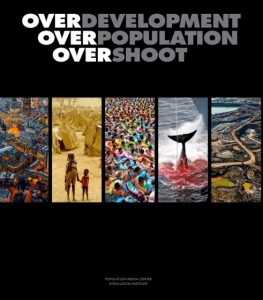 I have no children of my own, so any descendants of my sister will be my closest relatives in the distant future. My nephew and niece are 10 and 12 years old right now; if they have children about age 30, my grandnieces or grandnephews will be born around 2035; if they in turn have children at about age 30, my great-grandniece – who I am calling Emily because I’ve always liked the name – will be born around 2065 and come of age around 2085. That’s 70 years from now- far enough in the future that I can imagine the global impacts of overpopulation and over-consumption will have changed life as we know it. I write to Emily because it helps me process what’s happening on our planet, and because I want her to know I cared about her – because as she looks back, I think she’s going to doubt that.
I have no children of my own, so any descendants of my sister will be my closest relatives in the distant future. My nephew and niece are 10 and 12 years old right now; if they have children about age 30, my grandnieces or grandnephews will be born around 2035; if they in turn have children at about age 30, my great-grandniece – who I am calling Emily because I’ve always liked the name – will be born around 2065 and come of age around 2085. That’s 70 years from now- far enough in the future that I can imagine the global impacts of overpopulation and over-consumption will have changed life as we know it. I write to Emily because it helps me process what’s happening on our planet, and because I want her to know I cared about her – because as she looks back, I think she’s going to doubt that.
Dear Emily,
You probably wonder what we were thinking. I imagine you looking at the pictures and statistics from our time and wondering how we could turn a blind eye to the damage we were causing. How we could happily and obliviously go about our personal lives while participating in a system of infinite growth on a finite planet. How we could be so stupid, selfish, and cruel.
Frankly, I ask myself the same questions. I’ve asked them for the past 40 years of my life, but with each passing year the whole situation gets more and more critical. I see some evidence that people are getting worried. I suppose that’s a start. But I see no evidence that we’ve started the kind of change that’s going to be required to alter the course we’re on. That’s all we can conceive of right now are incremental little things that don’t impact our daily lives much, like buying organic produce or increasing the fuel efficiency of passenger cars.
Emily, I can give you lots of excuses, but I know they’re all going to sound pretty lame. What I care about more is letting you know how much pain we’re in, and how difficult this is – even for those of us still living in peace and material prosperity. Most of us don’t consciously acknowledge our stress yet, but we’re experiencing increasingly intense levels of cognitive dissonance.
On the one hand we have our personal lives with their births, deaths, celebrations, music, joy, projects, friendships, adventure, and challenge. We cultivate gardens and enjoy watching television shows about murder mysteries and zombies. On the other hand we are aware of extinctions, climate change, starvation, ecological collapse, and immense injustices caused by greed. We know that if we fully comprehended any one of these disasters we would be crushed with grief and despair. The personal lives for which we feel such gratitude would seem like inconsequential daydreams in comparison.
Let me give you a real-life example. My husband and I just bought a house. We are very excited about it. It’s a modest house, relatively speaking, although of course it’s much more than most of the people in the world have. It’s got wide eaves and bracken ferns coming up in front. Inside it has a spacious, meandering feel, and lots of closets. We especially love the walk-in pantry, and look forward to cooking more meals at home instead of eating out so much.
The large back yard is especially lovely, and I am amazed how powerfully grounding it is to get outside and do yard work! Almost all of my typical work involves sitting at the computer, and most of my leisure also entails staring at a screen of some kind. Contrast this to spending 1.5 hours mowing our lawn with a manual push-mower (yes, my neighbors probably think I’m crazy) – ah, what joy! No thought is required. You just start at one end and keep going until you’re done. At first it may look like an insurmountable task, but eventually the project is finished, how amazing.
I have been so caught up in buying a house, selling a condo, and moving, I have hardly had any time to think about the state of the planet. I have just committed to a 30-year mortgage, even though none of us has any idea what the world is going to be like 30 years from now. Underneath my joy and excitement simmers a sense of foreboding.
I just can’t reconcile my lived experience with what I know is happening, but I’m trying. The other day I discovered an amazing book, Overdevelopment, Overpopulation, Overshoot (OVER), that may give me a way to integrate The Global Emergency into my reality a little bit more. OVER communicates primarily through images – incredible photographs carefully chosen to portray the global impacts of over-development and overpopulation. Statistics are one thing, but witnessing it – letting the image seep into your brain and trigger things in your heart – is quite another.
You can view the whole book online, but after paging through part of it this way, I wanted to have a physical copy to contemplate. In the middle of one of my house-related errands I stopped by our local bookstore and bought one. The book is huge and heavy, and came protected in shrink-wrap. Buying it felt like a significant, emotional, and spiritual act. I didn’t open it until a couple of days later, when I could sit down with it and give it my full attention. I plan to work my way through it slowly, and then start over.
Looking at images of global devastation of people, ecosystems, and species is awfully sad and overwhelming. At this point, Emily, many of us still have a choice about looking. If we get too obsessed about the terrible things that are going on, we start alienating our friends and family. Again there’s the clash between our everyday lives and the larger reality. It’s very easy to make people feel defensive or guilty about their choices – which only makes them less inclined to look at what’s going on.
So I quietly page through my global disaster tome, write to you, and plan where to plant native strawberries in my new yard. It’s crazy-making, but I’m doing the best I can. At least, I think I am.












